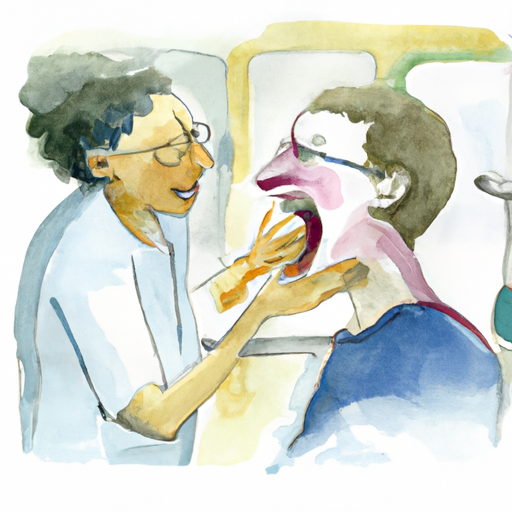When it comes to dental health, everyone deserves to receive the necessary care and treatment. However, patients with special needs often face unique challenges and require specialized dental care. Understanding their specific dental needs, tailoring treatment approaches, and exploring the causes and challenges they may encounter are crucial steps in providing optimal dental care for these individuals. In this article, we will delve into the various aspects of dental treatment for patients with special needs, including diagnosis, symptoms, tailored treatment strategies, and an overview of the causes and challenges they may face. By gaining a deeper understanding of these important considerations, we can strive towards providing comprehensive and compassionate dental care for all patients, regardless of their individual needs.
1) "Understanding the Unique Dental Needs of Patients with Special Needs: Diagnosis and Symptoms"
Patients with special needs often require unique consideration and specialized dental care. Understanding their dental needs is crucial for providing appropriate diagnosis and treatment. Special needs can encompass a wide range of conditions, including but not limited to intellectual disabilities, physical disabilities, developmental disorders, and medical conditions.
Diagnosing dental issues in patients with special needs can be challenging due to various factors. Communication difficulties, sensory sensitivities, and behavioral challenges may hinder the ability to obtain a comprehensive medical history or perform a thorough examination. Additionally, some individuals with special needs may have difficulty expressing pain or discomfort, making it imperative for dental professionals to be vigilant in identifying subtle signs and symptoms.
Symptoms of dental issues in patients with special needs may manifest differently compared to individuals without special needs. Some common symptoms to look out for include toothache, swollen or bleeding gums, bad breath, difficulty chewing or swallowing, and changes in eating habits. However, it is essential to remember that each patient is unique, and symptoms may vary depending on their specific condition.
The causes of dental issues in patients with special needs can be multifactorial. Oral hygiene practices might be challenging for individuals with physical disabilities or limited motor skills, leading to an increased risk of dental decay and gum disease. Certain medications or medical conditions may also have adverse effects on oral health, such as dry mouth or an increased susceptibility to infections.
To effectively address the dental needs of patients with special needs, a multidisciplinary approach is often necessary. Dental professionals should collaborate closely with other healthcare providers, caregivers, and family members to gain a comprehensive understanding of the patient’s overall health and specific challenges. This collaboration allows for a more accurate diagnosis and the
2) "Tailored Treatment Approaches for Patients with Special Needs: Strategies and Considerations"
Tailored Treatment Approaches for Patients with Special Needs: Strategies and Considerations
When it comes to dental treatment for patients with special needs, it is essential to adopt tailored approaches that consider the unique challenges and requirements of these individuals. Special needs can encompass a wide range of conditions, including physical, developmental, sensory, or cognitive impairments. Therefore, dental professionals must possess knowledge, patience, and empathy to ensure effective and comfortable treatment experiences for these patients.
One of the primary strategies in providing dental treatment for patients with special needs is effective communication. Dentists and their team should take the time to understand the patient’s specific needs and limitations. Some patients may have difficulty expressing themselves verbally, which requires alternative methods of communication such as sign language, picture boards, or written instructions. Establishing a trusting and comfortable environment is crucial, as it helps alleviate anxiety and enhances cooperation during treatment.
Additionally, dental professionals should consider the patient’s medical history and any related conditions that may impact their oral health. Patients with special needs often have a higher risk of developing oral health issues due to factors such as medication side effects, limited dexterity, or a compromised immune system. A thorough understanding of these conditions enables dentists to develop appropriate treatment plans and preventive strategies.
Furthermore, adapting the treatment environment to meet the unique needs of patients with special needs is vital. Dental offices can incorporate modifications such as wheelchair accessibility, specialized equipment, or sensory accommodations to ensure a comfortable setting. It is also essential to allocate sufficient time for appointments, allowing for breaks or shorter sessions if necessary.
Dental professionals should possess the skills and knowledge to manage patients with special needs effectively. Specialized training and education
3) "Exploring the Causes and Challenges of Dental Issues in Patients with Special Needs: A Comprehensive Overview"
Patients with special needs often face unique challenges when it comes to receiving dental treatment. These individuals can include those with intellectual disabilities, physical disabilities, developmental disorders, and sensory impairments. Exploring the causes and challenges of dental issues in patients with special needs is crucial to understanding their specific needs and providing effective treatment.
One of the primary causes of dental issues in patients with special needs is the difficulty in maintaining proper oral hygiene. Many individuals with special needs may have limited motor skills or cognitive impairments that make brushing and flossing difficult. As a result, plaque and bacteria can build up, leading to tooth decay and gum disease. Additionally, certain medications or medical conditions can contribute to dry mouth, which further increases the risk of dental problems.
Another cause of dental issues in patients with special needs is the lack of access to dental care. Many individuals with special needs face barriers in accessing dental treatment due to financial constraints, transportation issues, or a shortage of dental professionals trained to accommodate their specific needs. Consequently, these individuals may not receive regular dental check-ups or necessary treatments, exacerbating their oral health problems.
Challenges also arise during the diagnosis and treatment process for patients with special needs. Communication barriers can make it difficult for dental professionals to understand the patient’s symptoms and concerns. Some patients may have difficulty expressing pain or discomfort, leading to delayed diagnosis and treatment. Additionally, patients with sensory impairments may be sensitive to certain dental procedures, making it necessary to modify the treatment approach to ensure their comfort.
Furthermore, behavioral challenges can pose obstacles during dental treatment. Some patients with special needs may have difficulty sitting still or following instructions, making it challenging for dental professionals to




